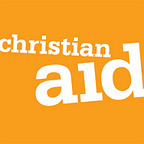The multiple faces of inequality in Latin America
Latin America is the most unequal region in the world. While poverty levels have reduced in economic terms over the past decade, social, political and environmental inequalities persist.
This is explored in Christian Aid’s new report, The Scandal of Inequality: the multiple faces of inequality in Latin America and the Caribbean. We highlight that inequality and exclusion are experienced due to various interconnecting factors, based on race, gender, sexuality, age, ethnicity, disability, geographic and economic differences.
The stories of inequality are real and impactful. Here we share some:
Ethnic and racial inequality
Latin America and the Caribbean is a racially and ethnically diverse region. There are at least 44.8 million indigenous people and 150 million people of African descent. Together, they represent more than 30% of the region’s population.
Racial discrimination is rife in many countries, with both indigenous and Afro-descendant groups having direct experience of racism — facing abuse, threats and violence, and suffering heavily from discriminatory social, economic and environmental policies.
Indigenous and Afro-descendant people are poorer and more excluded from access to good quality social services and the political system.
Economic inequality
Access to quality jobs is one of the big challenges in the region, and it is also an obstacle for reducing inequality. There is a growing consensus that poverty, extreme poverty and inequality in Latin America and the Caribbean cannot be overcome without actions to create sustainable jobs in urban and rural areas, particularly for the most marginalised.
Gender inequality
Inequality is the root cause of violence in the region. Social norms related to gender relations such as machismo create more violence, particularly within the family. Femicide and rape are rife in the region, and El Salvador holds the record for the highest murder rate of women in the world.
Identity inequality
Despite significant achievements regarding the rights of LGBTI people, the high level of violence against them is increasing across the region. Many lesbian, gay, bisexual, transgender and intersex (LGBTI) people are excluded, humiliated and attacked because of their sexuality.
Energy inequality
Lack of and inequitable access to modern energy prevents women from accessing basic services, and limits their ability to access education and develop businesses. In the Bolivian Amazon, most communities rely on firewood as their main cooking fuel. Dependency on firewood leads to deforestation, as it is estimated that each family uses up to 3kg of firewood every day.
Collecting firewood is mainly a burden for women, it is physically demanding and takes time. Deforestation means that women have to walk further and further from their community to look for fuel. Women are spending around 1 hour/day collecting firewood and up to 4 hours a day cooking over firewood. With our partners CIPCA, Soluciones Practicas and UNITAS, we are introducing solar cooking technologies as an alternative to firewood.
‘Working with our local partners has enabled us to understand more deeply the role of gender in inequality as well as the roles of ethnicity and race, and more recently, sexuality.
‘This knowledge has helped us to improve and refine our programs in the different countries in Latin America and the Caribbean.’
Christine Allen, Director of Policy and Public Affairs, Christian Aid.
